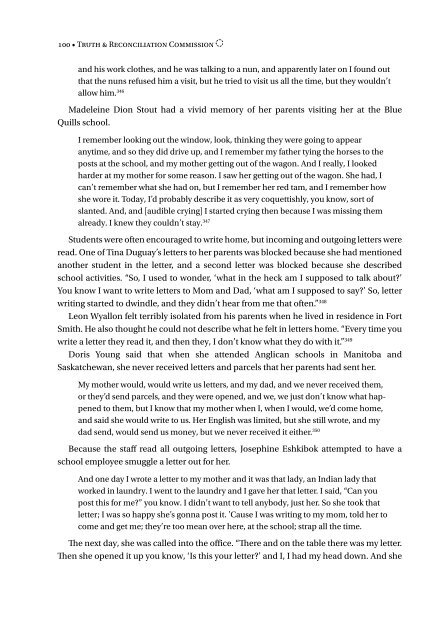The Survivors Speak
1MB8J05
1MB8J05
Create successful ePaper yourself
Turn your PDF publications into a flip-book with our unique Google optimized e-Paper software.
100 • Truth & Reconciliation Commission<br />
and his work clothes, and he was talking to a nun, and apparently later on I found out<br />
that the nuns refused him a visit, but he tried to visit us all the time, but they wouldn’t<br />
allow him. 346<br />
Madeleine Dion Stout had a vivid memory of her parents visiting her at the Blue<br />
Quills school.<br />
I remember looking out the window, look, thinking they were going to appear<br />
anytime, and so they did drive up, and I remember my father tying the horses to the<br />
posts at the school, and my mother getting out of the wagon. And I really, I looked<br />
harder at my mother for some reason. I saw her getting out of the wagon. She had, I<br />
can’t remember what she had on, but I remember her red tam, and I remember how<br />
she wore it. Today, I’d probably describe it as very coquettishly, you know, sort of<br />
slanted. And, and [audible crying] I started crying then because I was missing them<br />
already. I knew they couldn’t stay. 347<br />
Students were often encouraged to write home, but incoming and outgoing letters were<br />
read. One of Tina Duguay’s letters to her parents was blocked because she had mentioned<br />
another student in the letter, and a second letter was blocked because she described<br />
school activities. “So, I used to wonder, ‘what in the heck am I supposed to talk about?’<br />
You know I want to write letters to Mom and Dad, ‘what am I supposed to say?’ So, letter<br />
writing started to dwindle, and they didn’t hear from me that often.” 348<br />
Leon Wyallon felt terribly isolated from his parents when he lived in residence in Fort<br />
Smith. He also thought he could not describe what he felt in letters home. “Every time you<br />
write a letter they read it, and then they, I don’t know what they do with it.” 349<br />
Doris Young said that when she attended Anglican schools in Manitoba and<br />
Saskatchewan, she never received letters and parcels that her parents had sent her.<br />
My mother would, would write us letters, and my dad, and we never received them,<br />
or they’d send parcels, and they were opened, and we, we just don’t know what happened<br />
to them, but I know that my mother when I, when I would, we’d come home,<br />
and said she would write to us. Her English was limited, but she still wrote, and my<br />
dad send, would send us money, but we never received it either. 350<br />
Because the staff read all outgoing letters, Josephine Eshkibok attempted to have a<br />
school employee smuggle a letter out for her.<br />
And one day I wrote a letter to my mother and it was that lady, an Indian lady that<br />
worked in laundry. I went to the laundry and I gave her that letter. I said, “Can you<br />
post this for me?” you know. I didn’t want to tell anybody, just her. So she took that<br />
letter; I was so happy she’s gonna post it. ’Cause I was writing to my mom, told her to<br />
come and get me; they’re too mean over here, at the school; strap all the time.<br />
<strong>The</strong> next day, she was called into the office. “<strong>The</strong>re and on the table there was my letter.<br />
<strong>The</strong>n she opened it up you know, ‘Is this your letter?’ and I, I had my head down. And she


